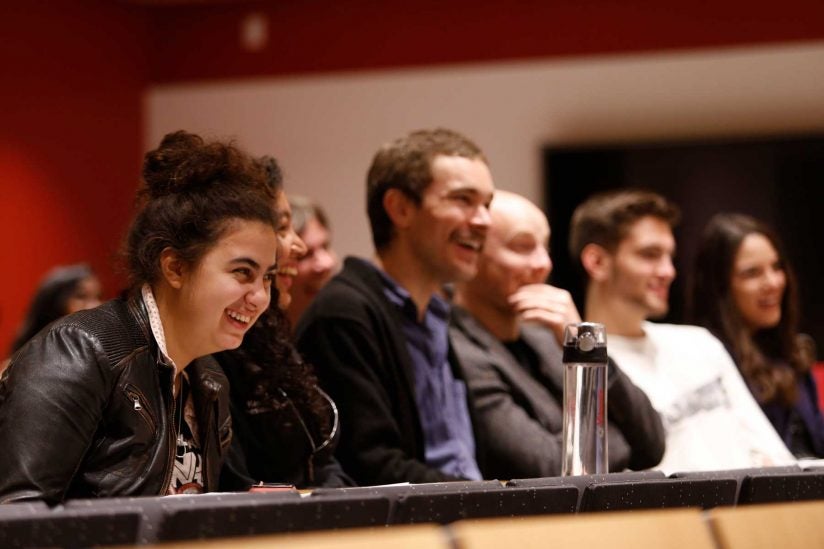
Alexandra Billings performs at the USC School of Dramatic Arts. (Photo/Michael Rueter, Capture Imaging)
Alexandra Billings of Transparent talks transitioning, teaching and life experiences
The transgender writer, actor, singer and theater arts teacher cautions students to have realistic career expectations
Alexandra Billings began learning stagecraft behind the scenes and on stage as a child and adolescent, always painfully aware of the wrongness of her physical gender identity.
“Life isn’t something that happens to you,” said Billings, a cast member of the critically acclaimed Amazon series Transparent. “I think life is something that happens for you. I don’t really see a difference between my profession and my life, and that’s how I approach all of my work: I take all of who I am, and all of who I was, into the room with me and do the best I can with what I know.”
Billings is a mixed-race transgender woman, an AIDS and LGBT activist, a writer, an accomplished stage and screen actor, an award-winning cabaret singer, and a respected theater arts teacher.
After transitioning, Billings launched a stage acting career that has encompassed hundreds of roles in plays and musicals off-Broadway and at local and regional theaters, from Steppenwolf’s original production of Charles Mee’s Time to Burn to her touring autobiographical shows, Before I Disappear, which had a lengthy off-Broadway run, I’m Still Here, Still and most recently, S/He and Me.

The subject of the 2009 Emmy Award-nominated PBS documentary Schoolboy to Showgirl: The Alexandra Billings Story, Billings is the offspring of a teacher and a longtime musical director of the Los Angeles Civic Light Opera who has joined the faculty of the USC School of Dramatic Arts.
Billings’ credits on the large and small screen, in both transgender and non-transgender female roles, include How to Get Away With Murder, Grey’s Anatomy and the feature film Valley of Bones.
Before joining the USC faculty, Billings was an assistant professor of theater arts at California State University, Long Beach, where she earned her MFA, and she has taught master classes in acting at universities from coast to coast, grounding her teaching in the Viewpoints, an improvisational acting tool originated by postmodernist choreographer Mary Overlie and expanded upon by renowned stage directors Anne Bogart and Steppenwolf’s Tina Landau, with whom Billings studied.
Viewpoints explained
The nine Viewpoints, Billings said, “are containers in which all human behavior fits. There’s a container called gesture, one called tempo, one called spatial relationship and so on. You can teach Meisner, Uta Hagen’s philosophy, and Stanislavsky’s philosophy and still use the Viewpoints language,” she said, “so I’m able to give my classes a common vocabulary, teach them about ensemble, break it apart and put it in a play, and then give them very specific exercises and tools they can carry with them.”
When faced with students’ unrealistic expectations, however, Billings is uncompromising.
“I’ve had many students say, ‘I want to win an Oscar,’ ‘I want to be on a TV show,’ ‘I want to win a Tony,’ ” she said. “And I tell them you should leave. Because I don’t know how to teach you how to do any of that — and neither does anyone else.
“I impart what I’ve learned in half a century of being on the planet,” Billings said, “and that’s what I teach — through the lens of other people’s words. All of the great storytellers have given us these great plays throughout the centuries, across the globe, collecting their humanity and handing it to us.
“Our job,” she said, “is to bring it to life as truthfully as we can with the experience that we have.”
